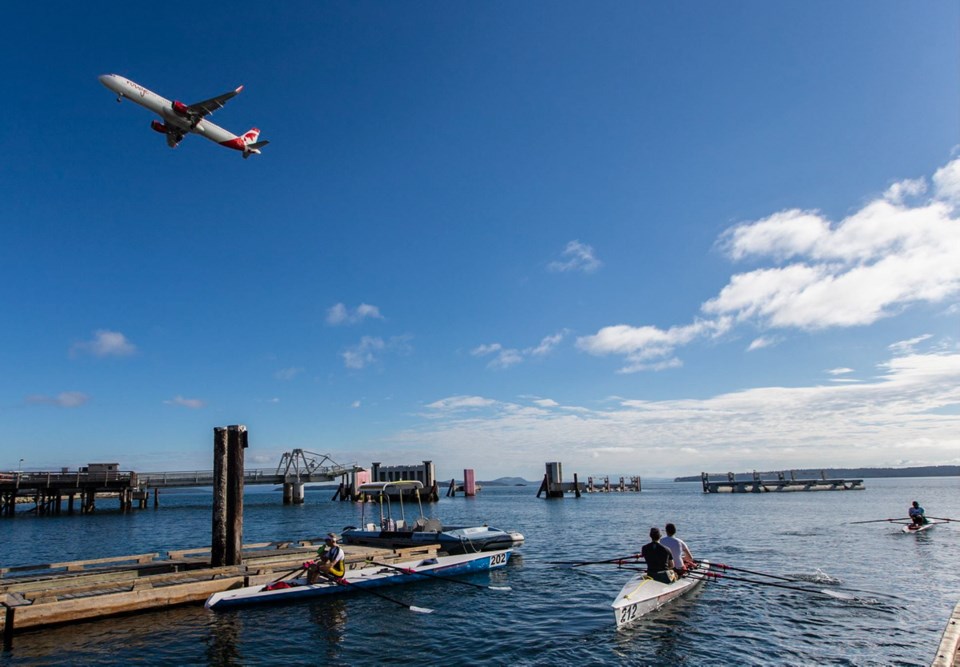There’s more to rowing than what you see on Elk Lake.
More than 500 competitors from 24 nations, including 14 crews from Canada, are about to prove that in the 2018 FISA World Coastal Rowing Championships today through Saturday off the Sidney shoreline at Tulista Park.
Coastal rowing involves sculls racing from four to six kilometres in singles, doubles and coxed quad. The sculls are self-bailing and wider, heavier and more stable than regular rowing craft.
Coastal rowing is not yet in the Olympics, but will be making its debut in the Pan American Games next year in Lima, Peru.
“There are so many different aspects to coastal rowing than flat-water rowing,” Adam Kreek of Victoria said.
Kreek should know. He has faced both flatwater and ocean water in big ways. Kreek won gold with the Elk Lake-based Canadian men’s eight at the 2008 Beijing Olympics. He then attempted a 2013 rowing crossing of the Atlantic Ocean from Senegal that ended with a capsizing in a storm, and a rescue off Miami, after 73 days.
“Coastal rowing brings you in contact more with winds, currents and longer distances,” said Kreek, now chair of Ergo Institute, which is working with the world championship organizing committee to make the event carbon-neutral.
“These are top-level athletes, but they are not subsidized because coastal rowing is not in the Olympics,” Kreek said. “They get less funding but they are passionate about this.
“You come more in contact with nature and push your limits. You need to be more of a navigator and you need more aerobic capacity. The boats are more stable in coastal rowing, so you need to be less technical. There is more slugging along than the acceleration and glide of flatwater rowing. I like both for what they are.”
Vancouver Island provides an ideal location for the World Coastal Championships because of its long and strong association with the sport of rowing. Rowing Canada is headquartered at Elk Lake, and the Island has produced numerous Olympic medallists.
That expertise is well-represented in the organizing committee of the 2018 World Coastal Championships, with two-time Olympic gold-medallist Brenda Taylor the chair and Olympic bronze-medallist Julien Bahain the regatta director. Marla Weston is also a key member of the committee.
“Rowing is something we are familiar with and are really good at doing on the Island, so this is a great place to hold the world coastal championships,” Kreek said.
“But Canadians, especially on the West Coast, are not as familiar with coastal rowing as they are with flatwater Olympic-class rowing. East Coasters, however, are more familiar with it and dory races. So in many ways, this is a classic Canadian sport. This is a reminder of our oared past.”
This is the first time the World Coastal Championships, sanctioned by the international rowing governing body FISA, have been held in North America. This year’s worlds follow the 2017 world championships on Europe’s Lake Geneva and are ahead of the 2019 world championships in Hong Kong. Past hosts have included Monaco and Istanbul. Greater Victoria beat out 12.5-million population Shenzhen, China, for the 2018 world championships.
Practice racing, with some preliminary qualifying, begins today. The qualifying races are Friday from 8 a.m. to 5:30 p.m. The B and A finals run Saturday from 8 a.m. to 4:30 p.m.
Vendors, food trucks, a craft beer and wine garden and entertainment will provide a festival feel at Tulista Park. Admission to the world championships is free.
To encourage the growth of coastal rowing on the Island, the 48 coastal boats being used in the world championships will be available for purchase by rowing clubs after the event.



